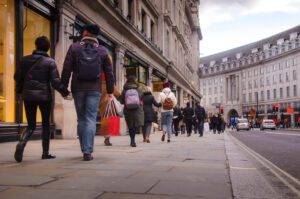
Tourism has always played a vital role in the growth of the British economy, particularly in the retail sector.
However, recent studies suggest that the introduction of a tourist tax, also known as the “tourist tax,” is tarnishing Britain’s sparkle as a global shopping destination. This article will explore the impact of the tourist tax on retail spending in London, providing insight into the consequences for businesses, the economy, and potential future developments.
The Decline of Tax-Free Shopping
Until January 2021, visitors to the UK from outside the EU were able to claim a VAT refund on their purchases, making shopping in the country more affordable and appealing. However, the removal of the tax-free shopping scheme has resulted in a decline in Britain’s retail industry. The UK is now the only country within the European Union that does not offer tax-free shopping to international visitors, making purchases 20% more expensive compared to neighboring countries.
The Economic Consequences
The absence of tax-free shopping in the UK has had a significant economic impact on both retailers and the wider economy. The British Retail Consortium estimates that the tourist tax is costing the UK economy a staggering £10 billion per year. With the decline in international visitors, retailers are facing a significant drop in sales, leading to job losses and store closures. The loss of tax-free shopping revenue also has a ripple effect on the wider economy, affecting tax revenues and public services.
Calls for Change
Business leaders across various industries have voiced their concerns and have called for the reinstatement of tax-free shopping in the UK. They argue that the UK’s reputation as a shopping haven is at stake, and urgent measures must be taken to restore its allure for international visitors. Over 350 businesses have sent an open letter to the Chancellor, Jeremy Hunt, urging him to address the situation and highlight the impact of the tourist tax on London’s economy.
The End of the VAT Refund Scheme
The VAT refund scheme ended in 2021 after the UK left the EU. It was part of a post-Brexit consultation about taxing items transported across borders for personal use. Kwasi Kwarteng reintroduced the tax-free shopping scheme, but Jeremy Hunt reversed the decision when he became chancellor, claiming it was unaffordable. However, a report by the luxury trade association Walpole found that tax-free shopping generated over £3 billion a year for the UK, highlighting the wider economic benefits.
The Future of Tax-Free Shopping
The future of tax-free shopping in the UK remains uncertain. London mayoral candidate Daniel Korski has proposed introducing a tourist tax on hotel rooms in London, similar to the scheme in Manchester, with the aim of raising additional funding for the Metropolitan Police. However, the impact of such a tax on tourism and the economy is yet to be fully understood. The London Finance Commission, an expert body set up by London Mayor Sadiq Khan, has also proposed the introduction of a tourist tax.
Potential Benefits of Tax-Free Shopping
Tax-free shopping is not just a perk for tourists; it is a vital economic driver for the retail industry and the UK as a whole. The scheme enables retailers to attract a significant number of international visitors, boosting sales and stimulating economic growth. By reinstating tax-free shopping, the UK can regain its competitive edge and attract more tourists, leading to increased spending and job creation. Additionally, tax-free shopping encourages tourists to explore local businesses and cultural offerings, benefiting the wider economy.
International Competitiveness
The absence of tax-free shopping in the UK has led to a loss of competitiveness in the global market. Neighboring countries within the European Union offer tax-free shopping, making their retail sectors more enticing for international visitors. This disparity puts the UK at a disadvantage, as tourists are more likely to choose destinations where they can enjoy tax-free shopping benefits. To remain competitive, the UK must align itself with other countries in the European Union and reinstate the tax-free shopping scheme.
Read more:
The Impact of the Tourist Tax on Retail Spending in London





